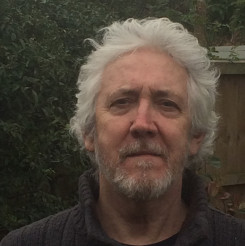Hellfire: Evelyn Waugh and the Hypocrites Club
David Fleming

From the moment in March 1924 that a tipsy young nun trying to gain entrance to Balliol College, Oxford, an all-male establishment, was unmasked as the son of the Bursar, rolling back after a scandalous party at its premises, the days of the Hypocrites Club – they were rumoured to eat new born babies boiled in wine - were numbered. The membership included some of the most interesting people of the next half a century or more. Its one-time Secretary was Evelyn Waugh – who used some nine of his fellow members as models in his fiction, not least in Brideshead Revisited.
Fellow members included Robert Byron, icon of travel writing thanks to his masterpiece The Road To Oxiana; the communist Claud Cockburn, whose journalistic motto was ‘believe nothing until it has been officially denied”; Anthony Powell, the ‘English Proust’ who wrote the twelve volume Dance To The Music Of Time; Henry Yorke, who wrote acclaimed modernist novels as Henry Green; Tom Driberg, a Labour politician whose sexual proclivities were so actively pursued that it was presumed he had some kind of official clearance; and Alfred Duggan, a super-wealthy alcoholic, called by Waugh ‘a full-blooded rake of the Restoration’, who had a car and chauffeur on standby to take him up to London to see his mistress, a nightclub hostess. He staggered his contemporaries by becoming a highly regarded historical novelist in his forties. And there are Harold Acton and Brian Howard, the models for Anthony Blanche of Brideshead Revisited.
Waugh’s minor characters drawn from the Hypocrites’ orbit include one half of Basil Seal, bitten to death by an ape with whom he was sharing a hotel room in Spain; and Lord Parakeet, whose real life inspiration once set the Thames on fire, and addressed his fellow members of the House of Lords as ‘My dears.’ The club’s only stated rule was that ‘Gentlemen may prance but not dance.’ It was often ignored.
The Hypocrites Club lasted less than three years: its members continued to be thorns in the Establishment’s side for the next five decades – even those who rather approved of it. This is the first book length portrait of what another member, the littérateur Peter Quennell called ‘a kind of early twentieth century Hellfire club’.
Book Details:
- Author: David Fleming
- On Submission
-
Rights Sold
- UK: History Press

David Fleming
David Fleming was born in Islington in 1957. He studied English Literature at Cambridge University. He worked in television as a writer, producer and director. He has written articles for several national newspapers, and two previous books’.
More about David Fleming
Book Reviews
-
"pacey and colourful read and, with the exception of the occasional anachronism (it is bizarre to refer to Waugh wearing “an Andy Warhol shock blond wig” in 1924 when the artist wasn’t born until 1928), elegantly written. "
Times -
"This is a pacey and colourful read and...elegantly written."
Times -
"The challenge in a group biography is to summarise the complexity of so many overlapping lives while keeping the narrative moving, and in this Fleming certainly succeeds. He alternates a lively account of high-spirited behaviour with vivid summaries of the achievements of Waugh, Byron and Cockburn..."
The Tablet -
" But Fleming writes just as adroitly as the gaiety recedes. [Referring to the later, more sombre parts of the main narrative.] Indeed, the whole book reads rather like a Powell novel, with unexpected meetings and reversals. If the centre cannot quite hold, it is a constant pleasure."
Mark Amory, Spectator -
"A quick, consequential read useful for even experienced intelligence professionals...in this brisk collective history of “the set”’...At a rollicking pace, it follows the post-Oxford careers of all the main Hypocrites...Waugh addicts will wish to add it to their shelves."
AN Wilson, Times Literary Supplement